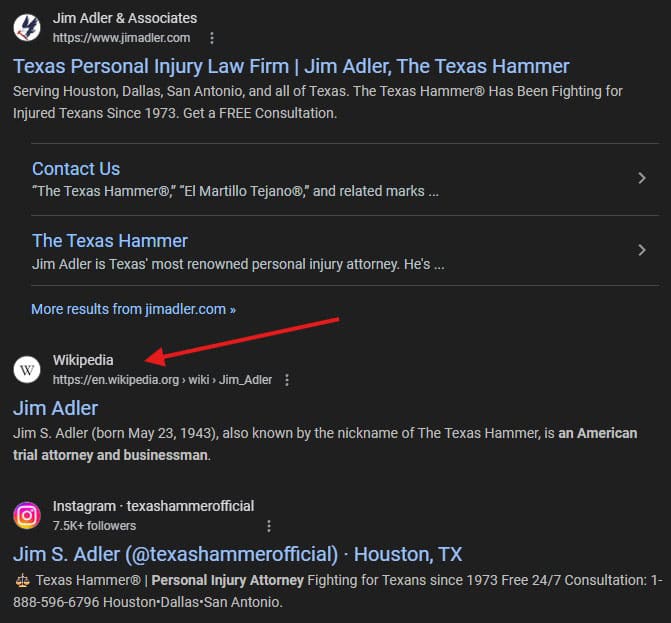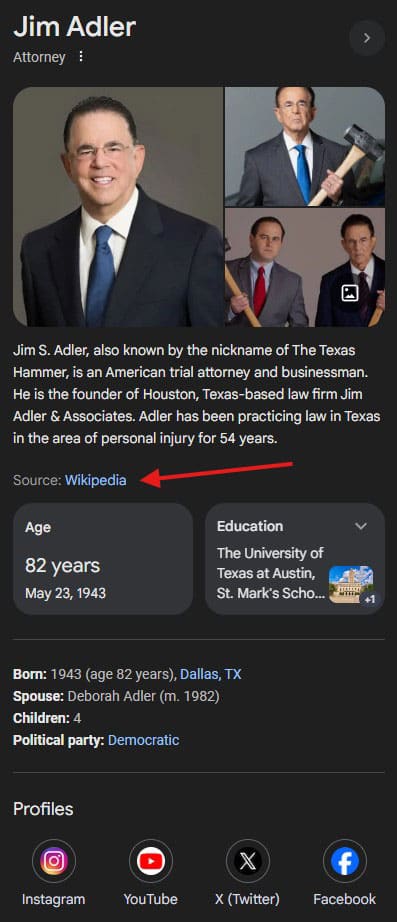Most law firms spend thousands trying to get backlinks, mentions, and “authority” signals – yet ignore one of the most powerful digital assets out there: a Wikipedia page.
When I helped get Jim Adler his own Wikipedia article, it didn’t just become a credibility booster. It became the #2 organic result when you search his name, right under his official website. That’s not an accident. That’s how Google works.

Let’s break down whether Wikipedia is worth it for you or your firm.
The Real Benefits of a Wikipedia Page
1. It Strengthens Your Google Presence
When someone Googles a lawyer’s name, the top 3 results shape their perception before they even click anything. If one of those is Wikipedia, you instantly look established, legitimate, and noteworthy.
Even if users don’t read the whole thing, seeing your name on Wikipedia builds subconscious authority.
2. It Improves Click-Through Rates
Wikipedia pages tend to have high trust signals. When potential clients see both your firm’s website and a Wikipedia listing, they’re more likely to click one of them.
And it usually pushes down less-credible content like review sites or directory listings.
3. Indirect SEO Value
Wikipedia uses no-follow links, so you won’t get direct link juice. But the indirect SEO effects are real:
- It feeds your Knowledge Panel (the right-hand info box on Google).
- It boosts entity recognition in Google’s Knowledge Graph.
- It creates structured references that reinforce your brand’s legitimacy.

In the example above, Jim Adler’s Knowledge Panel references Wikipedia, which strengthens the connection between his brand, his nickname “The Texas Hammer,” and his law firm.
4. Media and PR Synergy
Once you’re on Wikipedia, media outlets are more likely to cite you. Reporters view Wikipedia as a verification source. It can also lead to inclusion in lists (like “Notable Lawyers in Texas”) or local news citations referencing your page.
The Downsides (and What Most People Get Wrong)
1. You Can’t Write It Yourself
Wikipedia editors hate self-promotion. If you (or your marketing team) write your own article, it’ll likely get flagged or deleted.
To stick, the article must cite independent, reliable sources. Think major newspapers, television coverage, or award write-ups.
2. You Need Genuine Notability
Wikipedia’s threshold for lawyers is higher than most think. Just being successful, ranking high on Google, or advertising heavily won’t cut it.
You need third-party press or historical significance (e.g., landmark cases, major settlements, or cultural relevance). Jim Adler qualified because of his widespread TV presence and media coverage.
A typical law firm without that level of exposure probably won’t pass notability review.
3. It’s Not Marketing Copy
You can’t control your brand narrative like you can on your website. Editors will remove “fluff,” self-promotion, or unverifiable claims.
The tone must be encyclopedic, not sales-driven.
4. You Risk Negative Information
Wikipedia’s goal is neutrality. If your firm has ever been involved in a lawsuit, controversy, or disciplinary issue, it could end up listed. And once published, you can’t just delete it.
You can request corrections, but editors have final say.
What It Takes to Qualify
If you’re wondering whether your firm could qualify, ask yourself:
- Do we have significant media coverage in independent outlets?
- Have we been referenced or profiled in national or state publications?
- Have we handled noteworthy cases that shaped public policy or industry practice?
- Does our founder or managing partner have public recognition beyond marketing ads?
If you answered “yes” to most of those, your firm may qualify. Otherwise, it’s better to focus first on earning coverage before attempting Wikipedia.
How to Build Toward a Wikipedia-Eligible Profile
Even if you’re not ready yet, here’s how to build notability over time:
- Get PR Coverage
Publish thought leadership pieces in major outlets (Forbes, ABA Journal, Law.com, etc.). These citations can later be used as references. - Publish Academic or Legal Commentary
Whitepapers, amicus briefs, or law review mentions can all help establish credibility. - Win or Handle Publicly Reported Cases
Especially those covered in news outlets. - Earn Awards From Credible Bodies
“Best Lawyers in America” or “Super Lawyers” can help but only if covered by recognized publications. - Avoid Self-Referential Citations
Press releases on your own site or blog don’t count.
Should You Pay for a Wikipedia Page?
There are “Wikipedia writing services” out there but tread carefully.
Most are against policy and will get your article deleted. Wikipedia editors routinely spot these.
Paying someone only makes sense if they are a verified editor with a proven track record and they strictly follow citation and neutrality rules.
If you decide to pursue it, make sure it’s built ethically, backed by real third-party citations, and disclosed transparently.
The Bottom Line
A Wikipedia page can elevate your reputation, improve your search results, and add credibility you can’t buy through ads. But it’s not for everyone.
If your law firm has real public presence, media coverage, or influence then yes, it’s worth pursuing.
If not, focus first on earning that recognition organically through PR, thought leadership, and client success stories.
When the time is right, a well-built Wikipedia article will do what SEO alone can’t: cement your firm’s legitimacy in the eyes of both Google and the public.
Quick Takeaway
Worth it: for notable firms and lawyers with strong media footprints.
Not worth it yet: for smaller firms without third-party coverage.
Always worth planning for: as a long-term credibility goal in your digital strategy.

